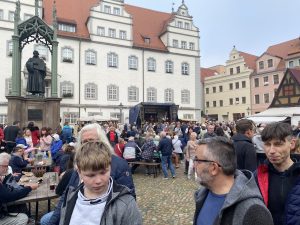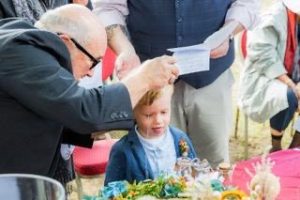Chris Heavner, Clemson, SC
Warm-up Question
- At what point did you realize that this week is Reformation Sunday?
- Have you been planning for weeks?
- Did you make sure your red clothing was washed and ready?
- Is this devotion your first reminder?
- Have you been planning for weeks?
Reformation? Renewal? Realignment? Reformatting?
“Reformation” is one of those words which can refer to a general reforming of “an institution or practice,” or it can refer to the events which began in Wittenberg, Germany in the 16th century. Which reference is best known in your community?
I had opportunity to be in Wittenberg, Germany on Reformation Day in 2022. There was a huge street festival filling and spilling over from the massive town square. There, statues of Martin Luther and Philip Melanchthon serve as reminders of the significance of the events which happened there in 1517. Among the revelers, few seemed concerned with the 16th century “Reformation” which catapulted this village onto the world stage. The festival was lots of fun but did little to call to mind the roots of our “justification by grace through faith” Reformation mantra. I was in Wittenberg to lead worship in the Chapel next to the congregation where Martin Luther served as preacher. Our service that day had a few more attendees than normal, but not the crowds who were working their way through the booths on the square.
festival filling and spilling over from the massive town square. There, statues of Martin Luther and Philip Melanchthon serve as reminders of the significance of the events which happened there in 1517. Among the revelers, few seemed concerned with the 16th century “Reformation” which catapulted this village onto the world stage. The festival was lots of fun but did little to call to mind the roots of our “justification by grace through faith” Reformation mantra. I was in Wittenberg to lead worship in the Chapel next to the congregation where Martin Luther served as preacher. Our service that day had a few more attendees than normal, but not the crowds who were working their way through the booths on the square.
I was back in Germany this September. This time, there were no street festivals. There were no crowds elbowing their way to the front. A small congregation assembled for a baptism. Henry is the four-year old child of a young woman we came to know through Lutheran Student Movement-USA and the World Student Christian Federation. A decade earlier, she had an internship through the Evangelical German Church (EDK) which brought her to the U.S. and to the ELCA to learn how we go about youth and young adult ministry. Henry’s baptism was a profound reminder that The Reformation (the one that traces its root to 16th century Wittenberg) binds followers of Jesus all around the world with an appreciation of what it means to love God, be loved by God, and share the Good News of God.
go about youth and young adult ministry. Henry’s baptism was a profound reminder that The Reformation (the one that traces its root to 16th century Wittenberg) binds followers of Jesus all around the world with an appreciation of what it means to love God, be loved by God, and share the Good News of God.
“Lutherans” in North America trace their roots to numerous countries around the globe. Among my friends are Lutherans from India, many from Finland, and still others from Tanzania. Swedish, Norwegian, and Danish hymnals are found in countless number of our ELCA congregations. The only thing special about Germany is being home to the first of the reformers. It is special to me because I have had so many opportunities to visit. This helps me reflect on what it means to be “Lutheran,” particularly at a time when the Church appears to be in the midst of tremendous change.
As you reflect on what it means to be Lutheran, I would encourage you to remember that Martin Luther was far from a perfect role model. He did say and write some horrible things about those of Jewish ancestry. Luther admitted this and begged that no one would be known by the name of Luther. Luther wrote: “There is but one name by which we should be known and that is the name of Christ.”
“Reformation” is not something we decide to do. It comes out of necessity. How might God be calling upon us to reform, reshape, reboot? “The Reformation” should serve as an encouragement to be ready for the next change into which God is calling the Church.
Discussion Questions
- What would you like to see “reformed”?
- What are the leaders of your faith community (think congregation) teaching you?
- What would you like to hear them talking about?
Reformation Sunday
(Text links are to Oremus Bible Browser. Oremus Bible Browser is not affiliated with or supported by the Evangelical Lutheran Church in America. You can find the calendar of readings for Year A at Lectionary Readings.)
For lectionary humor and insight, check the weekly comic Agnus Day.
Reflection on Romans 3
There are two words in this passage which determine how we will understand the whole passage: “grace” and “faith.” Take a moment to reread verses 22, 24, 26, and 28 in Romans 3.
Let’s start with “faith”. There are many ways to speak of faith and what it means in the life of one who seeks to follow Jesus. Is faith (as most of those in my part of the country speak of it) the ability to “believe things others would find unbelievable”? When understood this way, “faith” becomes cognitive assent to a set of confessions or affirmations. Others seem to associate faith with seeing the world from a particular perspective (God’s perspective), or with the ability to trust that things work together for good. None of these are mutually exclusive, but where we start may impact where we end.
One note which might guide our thinking is to see the footnotes associated with the repeated use of the word “faith” in these verses. In a study bible, the footnote will remind you that the Greek phrase translated “faith in Jesus” could also be translated as the “faith of Jesus.” How do we read these verses if we were to read, “(God) justifies the one who has the faith of Jesus”? What was the faith “of” Jesus? Might the phrase even invite us to consider the faith Jesus has in us?
Seeing faith this way aligns well with Martin Luther’s preferred way of thinking about grace. In his disputes with the other reformers, Luther refused to accept any pre-conditions for God’s grace being freely bestowed. This is a prevenient grace; it is the grace that goes before anything else. It is a grace which acts on us, so that we might respond – perhaps respond by that which is spoken of as “faith.”
One seminary teacher asked us to consider whether we understood “faith” as the capacity to receive God’s grace, or if we thought of ourselves as persons to whom the “grace” had been given so that we might respond in faith. Put differently, do we craft faith as a vessel into which God can then pour grace? Or is grace a gift from God which then makes faith possible?
Perhaps your congregation will sing “Amazing Grace” this Sunday. The first line of the second stanza speaks of grace as prevenient grace: “Twas grace that taught my heart to fear.” Remember that “fear” does not mean being frightened; instead, it is the host of emotions which comes from being welcomed into the presence of God.
There is one more, and absolutely essential, thing to remember. The followers of Martin Luther never insist that we, and we alone, possess all insights or answers. We trust that God has placed on our hearts a particular way of seeing, understanding, and living the Good News. In response, we must share what we have first received. We want everyone to know that God’s grace is much wider than the reach of our institutions, much deeper than our most profound thoughts. God’s grace is what makes it possible for us to join in those joyous celebrations of all the wonders of creation!
Discussion Questions
- How do you understand the word “faith”?
- What difference does it make to shift from thinking about “faith in Jesus,” to “faith of Jesus”?
- What do you think Jesus’ faith was like?
- What might your Lutheran community share with other faith communities in your area?
- What does your Lutheran community need to learn from those neighboring faith communities?
Activity Suggestions
- Take a look at Luther’s Small Catechism. It is printed near the back of the ELW Hymnals. In particular, recall the explanation to the third article of the Apostles’ Creed and the sections regarding Holy Baptism.
- Gather around the baptismal font. Ask those who do not remember the day of their baptism (most of us were baptized when we were only a few weeks or months old) to speak of how something they don’t remember has changed their lives.
- On the day of your baptism, who carried you to the font? Share how their actions impacted the life you have gone on to live.
Closing Prayer
Gracious God, you knew me as I was formed in my mother’s womb. You cared for me as I entered the world and uttered my first cry. You looked at me with love when I took my first steps. With the grace which makes all things possible, enable me to respond in a way which shares with others the good news of your salvation. Take my life and let it be a light in the darkest corners and a beacon to those whom I encounter. Amen.




